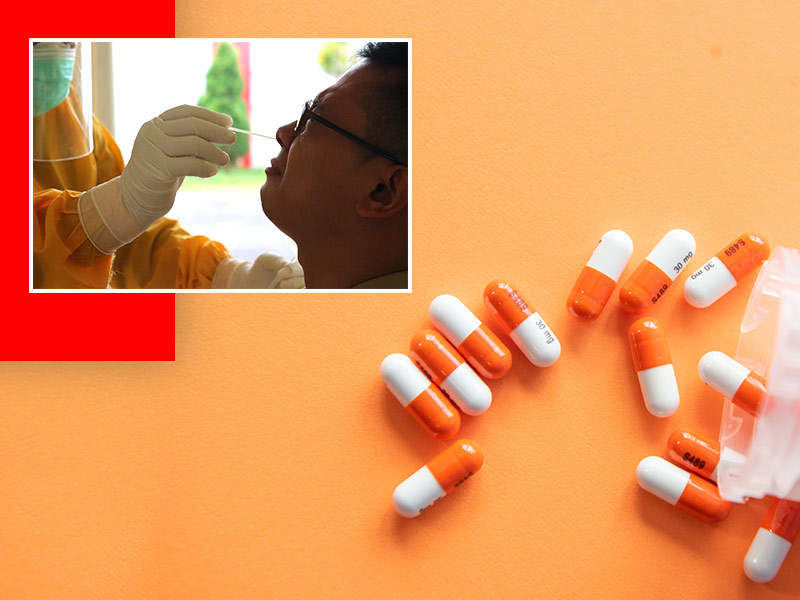
The antidepressant drug fluvoxamine may reduce the risk of prolonged hospitalisation in high-risk COVID-19 patients by a third, a study has found. The study, titled ‘Effect of early treatment with fluvoxamine on the risk of emergency care and hospitalisation among patients with COVID-19: the TOGETHER randomised, platform clinical trial’, was published in the journal The Lancet Global Health on Thursday. According to it, the antidepressant drug led to a reduction in hospitalisations of 32%.
About The Study & Its Findings
As many as 1,500 COVID outpatients were part of the study, which was conducted by researchers in North and South America. 741 COVID patients were given fluvoxamine, while 756 received a placebo. The drug, which is generally used to treat depression and obsessive-compulsive disorder (OCD), was studied for COVID-19 because of its anti-inflammatory properties. Swelling is often associated with COVID-19 as infection sometimes makes the immune system overreact. This is what the study found out:
- Among 741 COVID patients who were given fluvoxamine, 79 (about 10%) needed to extend their stay at the hospital.
- Among 756 in the placebo group, 119 (15.7%) were hospitalised.
- 12 patients in the placebo group died while one died in the antidepressant group. This shows fluvoxamine might also help in reducing COVID-induced deaths.
About The Drug Fluvoxamine
An antidepressant drug, fluvoxamine is also used to treat OCD and social anxiety disorder. It belongs to the class of drugs known as selective serotonin reuptake inhibitors (SSRIs), which work by increasing the level of serotonin in the brain, says the US National Library of Medicine. Serotonin is a neurotransmitter that stabilises mood, emotions, and induces the feeling of happiness. The drug is taken orally. Just like any other medicine, fluvoxamine can cause certain side effects such as:
- Dizziness
- Dry mouth
- Nausea
- Weakness
- Nervousness
- Difficulty concentrating
- Headache
- Diarrhea and vomiting
- Stomach pain
- Constipation
- Decreased appetite
- Weight loss
These side effects are enough to tell you that despite its use for several mental health issues, do not self medicate. Consult a medical expert and follow his/her advice.
Also read: New COVID variant found in Indore, 7 People Infected
What Next?

The researchers of the study said that the findings can help in providing low-cost protection from COVID-19 especially in countries with unsatisfactory vaccine rollout. "Covid-19 still poses a risk to individuals in countries with low resources and limited access to vaccinations," said Edward Mills, the principal researcher of the trial, reported news agency AFP. Thus, finding “inexpensive, widely available, and effective therapies” against the viral infection can help, he said, adding that “repurposing existing medications that are widely available and have well-understood safety profiles is of particular interest.”
Although the findings of the study appear positive, more research is needed into this. Also, since the drug is addictive, its use should be carefully analysed.
About COVID-19
A viral infection, COVID-19 is caused by the novel coronavirus, which was first detected in China in December, 2019. Since then, it has infected over 245 million people globally and has killed close to five million of them. Symptoms associated with COVID-19 are:
- Fever
- Cough, cold and sore throat
- Loss of taste and smell
- Fatigue
- Headache
- Body pain
- Skin rash
- Diarrhea
Also read: UK Study Finds Link Between COVID Vaccines & Rare Neurological Disorders
Some serious symptoms include breathlessness, and chest pain, as per the World Health Organisation. All COVID patients need to be isolated to prevent the disease from spreading. Although those with mild symptoms can recover at home, those with serious ones need hospitalisation. Many COVID-19 vaccines are now available and 6.8 billion doses have already been administered across the world.
Photo Credit: Unsplash
Also watch this video
How we keep this article up to date:
We work with experts and keep a close eye on the latest in health and wellness. Whenever there is a new research or helpful information, we update our articles with accurate and useful advice.
Current Version